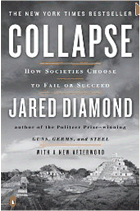

 |  |
Collapse
|
Please go to the new Coffee Coaster site implemented more gracefully in Wordpress. This page @ http://brianrwright.com/CoffeeCoasterBlog/?p=3074 |
 One of my most visited Coffee Coaster pages is the book review
I wrote on Jared Diamond's Pulitzer-Prize-winning
Guns, Germs, and Steel. In that review I criticize Dr. Diamond for failing to note major Western ideas:
One of my most visited Coffee Coaster pages is the book review
I wrote on Jared Diamond's Pulitzer-Prize-winning
Guns, Germs, and Steel. In that review I criticize Dr. Diamond for failing to note major Western ideas:
... Diamond does not properly attend to the above political achievements [reason and the concept of individual rights], nor to the concept of individual rights within the framework of large communities with common understanding. The effectiveness of the Founding Fathers' creation of liberty within community, especially with the federal concept, is relevant to guns, germs, and steel... not to mention production, trade, peace, and benevolence.
This criticism is also relevant to Diamond's more recent work, Collapse: Diamond performs a wonderful job assessing what has happened in distinct societies and cultures to make them fail or succeed, but seldom does he refer to any ideological characteristics. In our own case, looking at the condition of American culture or the culture of the West, don't you think its rise or fall will depend a little bit on whether the nonaggression principle—and all its core values: Constitutional liberty, the rights of man, small central government, individual freedoms, civil liberties, free speech and travel, etc.—are broadly understood by the people and observed by the state?
I'd say whether your society is a free one—meaning observing individual rights to (take actions for) life, liberty (be left alone), and property (having stuff that enables their material existence)—makes a huge difference in the equation of collapse. If freedom is not there, bye bye. If freedom is there, well, we still have some work to do. As most of us realize, freedom is not a sufficient condition for successful and prolonged life, but it is a necessary one. To Diamond, the question of whether some old culture or some current one is destined for the scrap heap is dependent on a five-point framework:
... with quite a fudge factor in item #5. (We mustn't forget that Professor Diamond, a skilled and bold observer of man in nature, is still by and large an academic. [I believe his main university connection is with UCLA.] The epistemological rigor of scholarship—which has been under decades of pressure from bureaucracy, political correctness, and anti-reason philosophies—has declined considerably. What is obvious to a normal man of sense is that "society's responses to its problems" tautologically determines whether those problems will be solved: you may as well say that how a baseball player performs determines whether he plays well or poorly.)
All right, all right, letting it go...
Mainly because what Diamond does manage is a fascinating ride of historical discovery that truly educates and informs.
Long story: he looks at 'civilizations' from the current ecosystem of the Bitterroot Mountains in Montana, USA, back to the denouement of Easter Island. Further, he looks at societies—current and past—that succeed, such as Japan and Iceland, asking why. He also discusses the billion-# gorilla of modern China and why its actions affect the planet so strongly; he delves into the problems of Australia of all things, showing some real concerns, mainly environmental, about its ability to avoid collapse. You will be astounded by the breadth of knowledge he conveys, about nooks and crannies of geography and anthropology you never imagined.
In the final part, Dr. Diamond lays out the whole deal, looking at the world itself as a culture subject to collapse or success. He forms the question negatively as the heading of Chapter 14: "Why Do Some Societies Make Disastrous Decisions?" Discussing there the following bullets:
Diamond brings to bear refreshingly clear analysis on any environmental problem... and, let's face it, all the the problems that pose the risk of collapse have their roots in "humanity not living or acting in a manner consistent with the natural environment upon which they ultimately depend." So the focus is necessarily environmental, and the news, I'm afraid is grim. It doesn't take a ghost come from the grave to tell us this dear Hamlet (my imagination hurls chunks when I consider the plastic islands forming in the oceans). As a scientist Jared gives it to us straight.
Short story: Jared gives us the natural and anthropological real deal. But he misses the boat on a couple of points of true knowledge, both in the political theory realm and in practical environmental solutions that promise astounding abundance. In the former, he does not credit or even explicitly acknowledge the modern nonaggression movement—freedom movement—of which so many of my regular readers are a part. He's sympathetic, I'm sure, because you can sense his deep sensitivity to all things human seeping through. But he seems astoundingly innocent of the ideas of liberty being salutary to truth and survival. I'll send him a note.
On missing the agricultural opp, consider this from a Bitterroot farmer:
"Farmers in our area face the decision: should we continue farming, or should we sell our land for home sites and retire? There's no legal crop that would let us compete with the house development value of our land..." — page 71
Hmmm, let's see, what illegal crop could solve those farmers' problems? To bemoan environmental problems without considering the manifest economy-saving potential of hemp and marijuana, for a brilliant scientist, borders on inexcusable ignorance. Legalizing life-saving technologies of abundance also falls out as a solution from the freedom equation. Jared, c'mon man![1]
Dr. D does end on a note of hope, basically suggesting rationality, voluntary simplicity, spiritual enlightenment—my term, meaning mainly letting go of addictions—, learning, and making courageous choices:
"My remaining cause for hope is another consequence of the globalized modern world's interconnectedness. Past societies lacked archaeologists and television. While the Easter Islanders were busy deforesting the highlands of their overpopulated island for agricultural plantations in the 1400s, they had no way of knowing that, thousands of miles to the east and west at the same time, Greenland Norse society and the Khmer Empire were simultaneously in terminal decline, while the Anasazi had collapsed a few centuries earlier, and Classic Maya society a few centuries before that. Today, though, we turn on our television sets or radios or pick up our newspapers, and we see, hear, or read about what happened in Somalia or Afghanistan a few hours earlier.... We have the opportunity to learn from mistakes of distant peoples and past peoples.... My hope in writing this book has been that enough people will choose to profit from that opportunity to make a difference."
Me, too.
[1] Jared does touch on what seems to be nearly universal in the collapse of civilizations: Page 177: the privileged arrogated riches to themselves on the backs of the nonprivileged, while these privileged ones exercised their short term material status addiction to the detriment of natural survival of the entire social system. Seems patharchy always attends a fall.
###
2011 February 25
Copyright © Brian Wright | The Coffee Coaster™
Collapse | Jared Diamond | Civilizations | Environmentalism | Deforesting

| Publish Fee: $25 Donation |  |
Please donate $1 for download of PDF | ||
|
Main | Columns | Movie Reviews | Book Reviews | Articles | Guest |